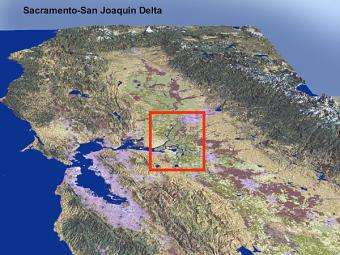Experts fear impacts of quake on San Francisco Bay Delta

A magnitude 6.5 earthquake could severely damage the San Francisco Bay Delta levee system and cut off vital water supplies for millions of Californians, according to findings presented by a panel of experts at a May 10 press conference in the Blume Earthquake Engineering Center.
The panelists, whose expertise ranged from risk analysis to civil engineering, also participated in the Shah Family Lecture, "A Katrina Legacy: Addressing Levee Safety and Public Policy in the U.S. and California," later that evening at Kresge Auditorium.
To prevent the intrusion of saltwater from the San Francisco Bay, between 1,100 and 1,600 miles of levees have been constructed in the Sacramento-San Joaquin River Delta during the last 100 years, creating 60 islands inhabited by 400,000 people and 500 other species. About 23 million Californians—roughly two-thirds of the state's population—depend to some extent on freshwater transported through the antiquated levee system, said Martin McCann Jr., a consulting professor of civil and environmental engineering at Stanford.
"The levees really are protecting bowls and holding back water 24/7, which is not typical of levee systems in most parts of the country," McCann told reporters. "One of our biggest concerns is the potential for an earthquake."
He cited a recent study predicting that a magnitude 6.5 earthquake on the western edge of the delta would cause 50 levee breaks that would fill the entire delta with saltwater—leaving thousands homeless and compromising drinking and irrigation water throughout the state for more than two years. While the likelihood of such a seismic event occurring is only 7 percent in the next 50 years, the economic loss could well exceed $40 billion, he added.
"We need to come to grips with this," warned Gerald Galloway, retired brigadier general in the Army Corps of Engineers and a research professor of civil and environmental engineering at the University of Maryland. "If we don't address it [in California], as we learned in New Orleans, the cost of not addressing it is billions of dollars."
A member of an advisory panel established by President Clinton following the disastrous Mississippi River floods of 1993, Galloway called for a national strategy to prevent similar catastrophes. "Our colleagues in the Netherlands and Japan have considerably higher standards," he said. "In the Katrina case, we were providing maybe 200-year protection to New Orleans for hurricanes, whereas the Dutch are shooting for 10,000-year protection."
The Dutch government established new high-risk standards in 1953 after a devastating flood killed 1,800 people in the Netherlands, said economist Carel Eijgenraam of the CPB Netherlands Bureau for Economic Policy Analysis. Dutch authorities authorized construction of a sophisticated dike system to protect much of the country from a 1-in-10,000-year catastrophic flood, Eijgenraam said. Although the project cost an estimated $10 billion in today's currency, the investment was worth it, he said, because it protects the country's 16 million inhabitants, two-thirds of whom live below sea level in regions where the economy is valued at more than $1 trillion.
Galloway pointed out that the enormous losses from Hurricane Katrina, which could exceed $100 billion, might have been prevented years ago by a $2.5-billion upgrade of the New Orleans levee system. He said that Californians should take heed and seriously consider supporting November's $4 billion ballot initiative to improve the state's levees.
"If it takes $4 billion and that's the level you're at, then that's what you need, but you can't not do it," Galloway argued. "People I talked to in New Orleans said, 'We thought we were protected.'"
Katrina was a wakeup call for the nation, he added: "If you could look into the eyes of the people of New Orleans and try to estimate what is the cost of family breakup, people being scattered and moved out of their homes, spousal abuse that takes place after an event like this, and put dollar figures on that, it would be far higher than I think we've ever given it credit for being."
Source: Stanford University, by Mark Shwartz




















